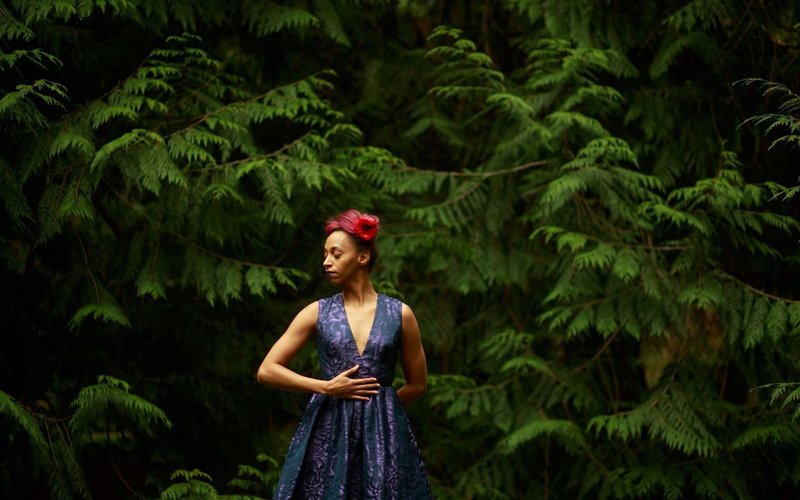
In her book Black Imagination: Black Voices: on Black Futures, conceptual artist and activist Natasha Marin asked Black artists in the Northwest and around the world three questions: What is your origin story? How do you heal yourself? and describe a world where you’re loved, safe and valued?
“I wanted to kinesthetically promote listening to Black folks,” Marin says. “This book, because it appears to be a book and we think we know what a book is, tricks you into listening to Black people, which everyone needs to practice.”
The book is a companion to piece for an ongoing project collecting Black voices. Marin is also an antiracism and digital racism consultant. She launched the site reparations.me in 2016, which was a platform for white identifying people to make offerings and respond to requests from people of color.
Sound & Vision host Emily Fox spoke with Marin about Black Imagination and what happens when you launch an online reparations platform.
On asking the question “what is your origin story?”:
I wanted to ask what your origin story is, because diasporic black folks, we have too often imagined our origins as part of our experience as kidnaped and stolen people, as displaced people. So, those answers were immediately recognizably fascinating.
On asking the question “how do you heal yourself?”:
I was interested in healing because I know we hear too many stories about Black pain, Black trauma, Black subjugation, and not nearly enough testimonies to how we heal and how we how we take care of ourselves as a means to persevering, as the sort of what's behind the scenes of our, quote unquote, resilience. Because Black people are absolutely human. We're just somehow not ever allowed to make mistakes or be weak or be vulnerable in the public imagination, in the white imagination.
On asking Black writers and artists to “describe a world where you feel loved, safe and valued”:
Imagining a world where we are loved, safe and valued definitely implies that the world we're in right now doesn't always love us or keep us safe or value us or make us feel valued. I'm an artist, obviously I wanted to make something beautiful that mattered to people. And I think I think maybe now I'm just now starting to believe that I might have done that. I wanted to make sort of a talisman against loneliness. So, if you have the black imagination, you have with you a community of Black voices.
On hearing the response to these questions from other Black artists and writers:
I definitely cried many times at so much of the beauty of the human experience. Black people are every body. I don't think people really understand that, that there is no monolithic blackness. So, what struck me wasn't thematic so much as it was anti-thematic. The theme was our complete diversity, our completeness that every feeling, every emotion, every response that's contained within the Black experience. Every question you might ask yourself. And that antiblackness as it shows up in everyone, including black people, is this idea that blackness is this one thing. So, we really have to push against that.
On launching the website reparations.me in 2016:
I launched the reparations social experiment so that folks could kinesthetically practice, like go through the motions of practicing leveraging their privilege, whether or not they were sort of ideologically ready to do so. So, reparations was a project that allowed white identified folks to make offerings and respond to requests made by people of color for anything that may bring reprieve, rest, restoration in the present tense for racial inequity.
On what Marin found on the platform:
If this whole thing were an experiment, which it was to me and I would be the role of data collector, what I noticed, the pattern in the data was actually that it's single Black mothers who are actually the most generous and willing to respond to requests. White identified folks had a pattern of offering things like walking your dog or here is a gift certificate to Abercrombie and Fitch. And meanwhile, the requests are like there are snakes in my house, I have children in my house, I need to be able to afford an exterminator, which is a pretty specific request. Which dog walking will not address. Not that dog walking is somehow not generous. It is. But also listening to what's being asked for is very important.
Marin is looking for more stories for Black Imaginations of Black people in diaspora. You can tell your story by e-mailing nonwhiteworks [at] gmail.com.
The poet, artist and educator spoke with Sound & Vision host Emily Fox about some of their poems. Their forthcoming book, Insubordinate, is out on August 27th.
Seattle’s Civic Poet spoke with Sound & Vision host Emily Fox for the show’s ongoing series on poets in the Northwest.
The poet and playwright spoke with host Emily Fox about his work as a part of Sound & Vision’s series on poetry.